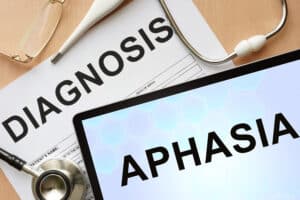Communication is a major part of connecting with the world around us. It allows us to share our thoughts, feelings, and important information with friends, family, and every other person we come in contact with. When a person loses the ability to communicate clearly, it impacts them socially, emotionally, and mentally. Aphasia refers to the inability to communicate clearly to others. Aphasia can prevent a person from being able to communicate by speaking, writing, and/or using sign language. It can make reading and writing difficult as well. The person understands that they are unable to communicate but cannot find the inner resources to relieve their struggles, making it an overwhelming condition. A therapist who provides in-home rehabilitation services can assist you and your loved one with techniques to help the communication process.

Common Causes of Aphasia
Aphasia often occurs after a head injury, stroke, brain tumor, or degenerative disease. The area of the brain responsible for controlling language is damaged. For some individuals, they may recover fairly quickly, but others may need months or years of occupational and speech therapy to help them retrieve the ability to communicate.
Seven Tips for Communicating with Your Loved One with Aphasia
As you journey down this road together, here are seven tips to help you communicate with your loved one.
- Remember that the person you are communicating with is still the same person with the same intelligence level and the same connections. You don’t need to dumb down your conversations with her or avoid topics that you could have discussed before.
- While they are still a mature adult, they may not be able to fully comprehend all the things you are telling them. Even if they nod in agreement, work toward knowing they truly understand what you are explaining.
- When it’s time to talk, make sure you have their complete attention by turning off the television or reducing other background noises such as music or loud people that may be in the room.
- Try to keep messages clear and concise. It’s important not to travel down random trails of information as you are trying to explain something. Keep the conversation focused on the topic and complete it as succinctly as possible. It may mean asking to wait to discuss any side topics so you can finish this one.
- Use support communication techniques. Using gestures to give more meaning to words such as lifting a pretend drink to the mouth when asking if they are thirsty can help. You can also point to photos or use facial cues to help communicate an idea or feeling.
- Be patient. Your loved one may need more time to create a response that makes sense. Let her have all the time she needs to respond.
- Don’t exclude them from conversations about them. If you and a family member are discussing what to make for the holiday dinner and your loved one usually plans it, include her in that conversation.
In-Home Rehabilitation for Aphasia
Your loved one might appreciate having someone come right to her home to provide speech therapy as she recovers from her condition. In-home rehabilitation can be especially helpful if she has transportation concerns or health concerns about visiting a clinic for treatment. A therapist who provides in-home rehabilitation can also work with other family members and help them discover together the best ways to communicate with your loved one so that she’ll feel heard when she has things she needs to communicate.
If you or an aging loved one are considering In-Home Rehabilitation Services in Lauderhill FL, please contact the caring staff at Star Multi Care today. Call 954-962-0926.
Star Multi Care is a Trusted Home Care Agency in Florida including Palm Beach, Miami Dade, and Broward County.
- In-Home Cancer Rehabilitation Can Provide Many Benefits - April 16, 2025
- Necessary Steps Caregivers Should Take To Care For Themselves - April 9, 2025
- Nutrition Tips for Seniors After They’re Released from the Hospital - April 3, 2025

